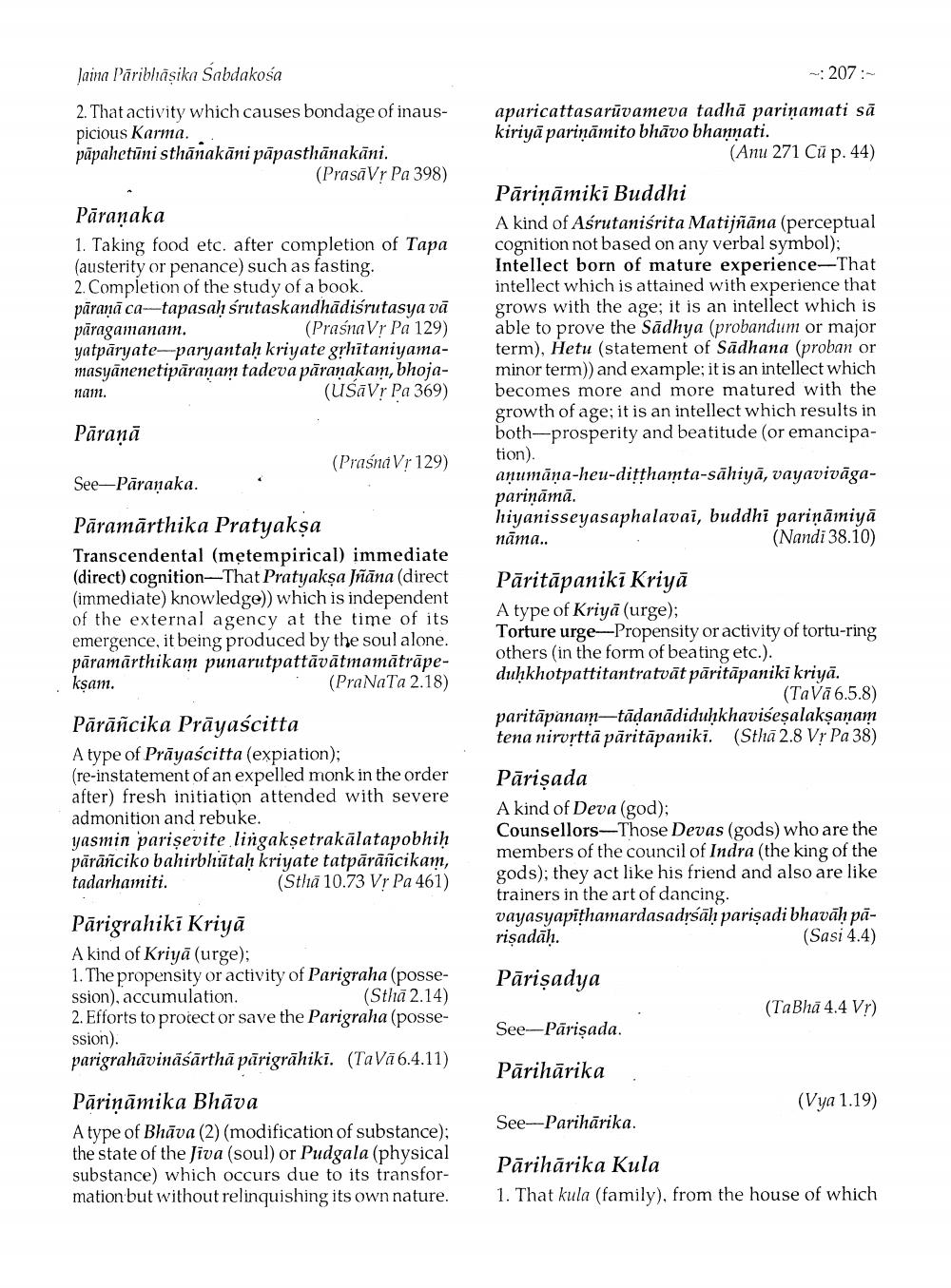________________
207 :
laina Pāribhāşikn Sabdakosa 2. That activity which causes bondage of inauspicious Karma. pāpahetüni sthānakāni pāpasthānakāni.
(PrasāVr Pa 398)
aparicattasarūvameva tadhā parinamati sā kiriyā pariņāmito bhāvo bhannati.
| (Anu 271 Cũ p. 44)
Pāranaka 1. Taking food etc. after completion of Tapa (austerity or penance) such as fasting. 2. Completion of the study of a book. pāraṇā ca---tapasah śrutaskandhādiśrutasya vā paragaтaпaт.
(Prasna Vr Pa 129) yatpāryate--paryantah kriyate grhitaniyamamasyānenetipāraṇam tadeva pāranakam, bhojanam.
(USĪVr Pa 369)
Pāriņāmiki Buddhi A kind of Aśrutanisrita Matijñāna (perceptual cognition not based on any verbal symbol); Intellect born of mature experience-That intellect which is attained with experience that grows with the age; it is an intellect which is able to prove the Sadhya (probandum or major term), Hetu (statement of Sadhana (proban or minor term)) and example; it is an intellect which becomes more and more matured with the growth of age; it is an intellect which results in both-prosperity and beatitude (or emancipation). anumāņa-heu-ditthamta-sāhiyā, vayavivāgapariņāmā. Iniyanisseyasaphalavai, buddhi pariņāmiyā nāma..
(Nandi 38.10)
Pāraņā
(Prasna Vr 129)
See-Pāranaka.
Pāramārthika Pratyakşa Transcendental (metempirical) immediate (direct) cognition-That Pratyakşa Jñāna (direct (immediate) knowledge)) which is independent of the external agency at the time of its emergence, it being produced by the soul alone. pāramarthikam punarutpattāvātmamātrāpekşam.
(PraNaTa 2.18)
Pāritāpanikī Kriyā A type of Kriyā (urge); Torture urge-Propensity or activity of tortu-ring others in the form of beating etc.). duhkhotpattitantratvāt pāritāpaniki kriyā.
(Tavā 6.5.8) paritāpanam—tādanādiduḥkhavišeşalakṣaṇam tena nirurttā pāritāpaniki. (Sthā 2.8 V? Pa 38)
Pārāñcika Prāyaścitta A type of Prāyascitta (expiation); (re-instatement of an expelled monk in the order after) fresh initiation attended with severe admonition and rebuke. yasmin parişevite lingakşetrakālatapobhiḥ pārāñciko bahirbhūtah kriyate tatpārāñcikam, tadarhamiti.
(Sthā 10.73 Vr Pa 461)
Pārişada A kind of Deva (god); Counsellors-Those Devas (gods) who are the members of the council of Indra (the king of the gods); they act like his friend and also are like trainers in the art of dancing. vayasyapithamardasadrsāh parişadi bhavā” pārişadāḥ.
(Sasi 4.4)
Pārigrahiki Kriyā A kind of Kriyā (urge); 1. The propensity or activity of Parigraha (possession), accumulation.
(Sthā 2.14) 2. Efforts to protect or save the Parigraha (possession). parigrahāvināsārthā pārigrāhiki. (TaVā6.4.11)
Pārişadya
(Ta Bhā 4.4 Vr)
See-Pārişada.
Pārihārika
(Vya 1.19)
See-Parihārika.
Pārināmika Bhāva A type of Bhāva (2) (modification of substance); the state of the Jiva (soul) or Pudgala (physical substance) which occurs due to its transformation but without relinquishing its own nature.
Pārihārika Kula 1. That kula (family), from the house of which




